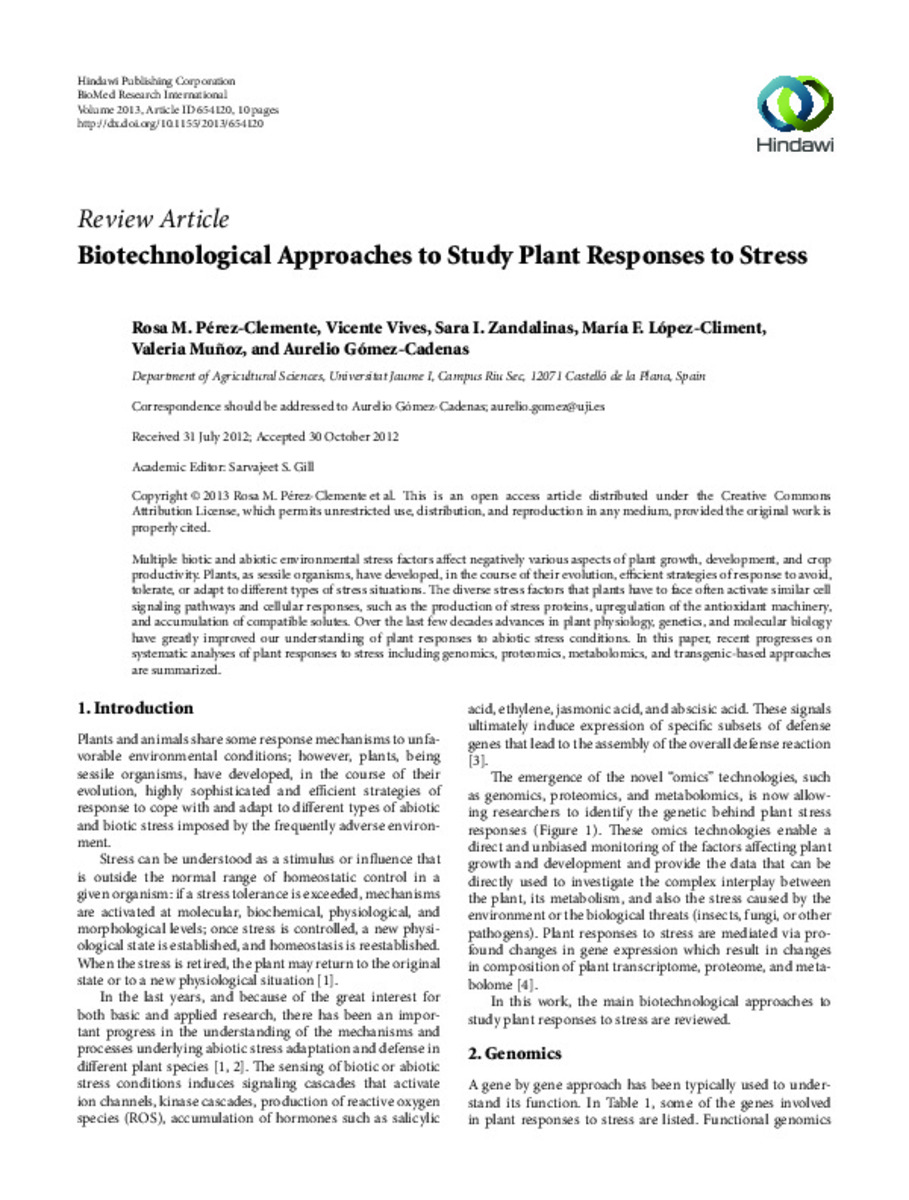Mostrar el registro sencillo del ítem
Biotechnological approaches to study plant responses to stress
| dc.contributor.author | Perez-Clemente, Rosa Maria | |
| dc.contributor.author | Vives, Vicente | |
| dc.contributor.author | I Zandalinas, Sara | |
| dc.contributor.author | López Climent, María Fernanda | |
| dc.contributor.author | Muñoz Espinoza, Valeria Alejandra | |
| dc.contributor.author | Gomez-Cadenas, Aurelio | |
| dc.date.accessioned | 2014-02-11T12:49:15Z | |
| dc.date.available | 2014-02-11T12:49:15Z | |
| dc.date.issued | 2013 | |
| dc.identifier.citation | Rosa M. Pérez-Clemente, Vicente Vives, Sara I. Zandalinas, María F. López-Climent, Valeria Muñoz, and Aurelio Gómez-Cadenas, “Biotechnological Approaches to Study Plant Responses to Stress,” BioMed Research International, vol. 2013, Article ID 654120, 10 pages, 2013. doi:10.1155/2013/654120 | ca_CA |
| dc.identifier.issn | 2314-6133 | |
| dc.identifier.issn | 2314-6141 | |
| dc.identifier.uri | http://hdl.handle.net/10234/83036 | |
| dc.description.abstract | Multiple biotic and abiotic environmental stress factors affect negatively various aspects of plant growth, development, and crop productivity. Plants, as sessile organisms, have developed, in the course of their evolution, efficient strategies of response to avoid, tolerate, or adapt to different types of stress situations. The diverse stress factors that plants have to face often activate similar cell signaling pathways and cellular responses, such as the production of stress proteins, upregulation of the antioxidant machinery, and accumulation of compatible solutes. Over the last few decades advances in plant physiology, genetics, and molecular biology have greatly improved our understanding of plant responses to abiotic stress conditions. In this paper, recent progresses on systematic analyses of plant responses to stress including genomics, proteomics, metabolomics, and transgenic-based approaches are summarized. | ca_CA |
| dc.format.extent | 10 p. | ca_CA |
| dc.format.mimetype | application/pdf | ca_CA |
| dc.language.iso | eng | ca_CA |
| dc.publisher | Hindawi Publishing Corporation | ca_CA |
| dc.relation.isPartOf | Biomed Research International, 2013 | ca_CA |
| dc.rights | Attribution-NonCommercial-ShareAlike 4.0 Spain | * |
| dc.rights.uri | http://creativecommons.org/licenses/by-nc-sa/4.0/ | * |
| dc.subject | Transgenic potato plants | ca_CA |
| dc.subject | MYB transcription factor | ca_CA |
| dc.subject | Element-binding factors | ca_CA |
| dc.subject | Lolium-perenne L. | ca_CA |
| dc.subject | Abiotic stress | ca_CA |
| dc.subject | Drought tolerance | ca_CA |
| dc.subject | Gene-expression | ca_CA |
| dc.subject | Acid biosynthesis | ca_CA |
| dc.subject | Salt stress | ca_CA |
| dc.subject | Arabidopsis-thaliana | ca_CA |
| dc.title | Biotechnological approaches to study plant responses to stress | ca_CA |
| dc.type | info:eu-repo/semantics/article | ca_CA |
| dc.identifier.doi | http://dx.doi.org/10.1155/2013/654120 | |
| dc.rights.accessRights | info:eu-repo/semantics/openAccess | ca_CA |
| dc.relation.publisherVersion | http://www.hindawi.com/journals/bmri/2013/654120/ | ca_CA |
| dc.edition | Pdf editorial | ca_CA |
Ficheros en el ítem
Este ítem aparece en la(s) siguiente(s) colección(ones)
-
CAMN_Articles [568]








